英语学习笔记2
- 格式:doc
- 大小:39.50 KB
- 文档页数:2

人教版英语九年级全一册unit2笔记以下是Unit 2的课堂笔记,包括了重要单词、短语、句型以及语法知识点:Unit 2 重要单词:1. adj. 疲倦的:tired2. v. 放松:relax3. adj. 焦虑的:anxious4. v. 害怕:fear5. n. 经验:experience6. v. 欣赏:appreciate7. n. 机会:opportunity8. v. 实现:achieve9. n. 目标:goal10. v. 挑战:challengeUnit 2 重要短语:1. take a deep breath 深呼吸2. hold my hand 握住我的手3. calm down 冷静下来4. get butterflies in my stomach 心头鹿撞5. worry about 为...担心6. be nervous about 对...感到紧张7. be anxious about 对...感到焦虑8. be scared of 对...感到害怕9. look forward to 盼望,期待10. in the future 在未来Unit 2 重要句型:1. I feel tired these days. (现在时态,描述当前状态)2. I was really nervous before the big speech. (过去时态,描述过去发生的动作)3. I will challenge myself to do things I didn't think I could do before. (将来时态,描述将来的动作)4. It's important to learn how to deal with stress. (形式主语,强调某事的重要性)5. I look forward to hearing from you. (固定句型,表示期待)6. I have a goal to achieve. (动词不定式作后置定语,表示目标)7. It's a waste of time doing sth. (动名词作主语,表示某事是浪费时间)8. I'm sorry to hear that you're feeling down. (固定句型,表示同情或安慰)9. The best way to relax is through exercise. (动词不定式作后置定语,表示放松的最好方式)10. I will try my best to get the job. (动词不定式作目的状语,表示努力) Unit 2 语法知识点:1. 现在完成时态(Present Perfect Tense):用于描述过去发生的动作对现在的影响或结果。
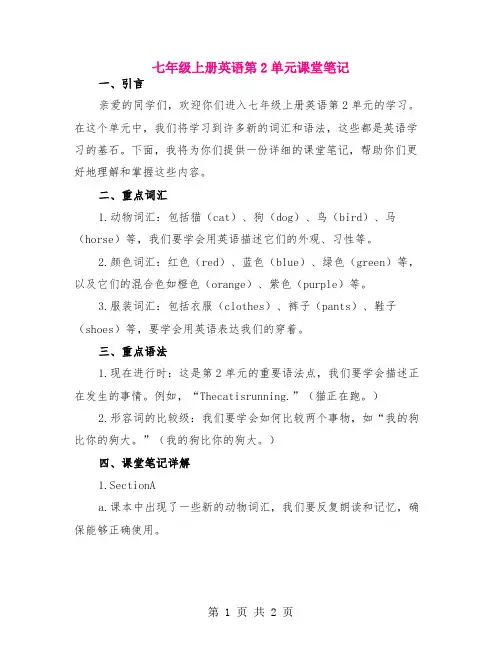
七年级上册英语第2单元课堂笔记一、引言亲爱的同学们,欢迎你们进入七年级上册英语第2单元的学习。
在这个单元中,我们将学习到许多新的词汇和语法,这些都是英语学习的基石。
下面,我将为你们提供一份详细的课堂笔记,帮助你们更好地理解和掌握这些内容。
二、重点词汇1.动物词汇:包括猫(cat)、狗(dog)、鸟(bird)、马(horse)等,我们要学会用英语描述它们的外观、习性等。
2.颜色词汇:红色(red)、蓝色(blue)、绿色(green)等,以及它们的混合色如橙色(orange)、紫色(purple)等。
3.服装词汇:包括衣服(clothes)、裤子(pants)、鞋子(shoes)等,要学会用英语表达我们的穿着。
三、重点语法1.现在进行时:这是第2单元的重要语法点,我们要学会描述正在发生的事情。
例如,“Thecatisrunning.”(猫正在跑。
)2.形容词的比较级:我们要学会如何比较两个事物,如“我的狗比你的狗大。
”(我的狗比你的狗大。
)四、课堂笔记详解1.SectionAa.课本中出现了一些新的动物词汇,我们要反复朗读和记忆,确保能够正确使用。
b.语法部分主要是现在进行时,可以通过动词的变化形式和be动词的当下时态来表达正在发生的事情。
例如,“Theboyisrunning.”(这个男孩正在跑。
)c.对于SectionA的阅读部分,要注意理解句意,特别是对现在进行时中be动词的用法。
2.SectionBa.这一部分主要是词汇学习和口语练习,我们要注意发音和语调,确保能够正确表达意思。
b.对于服装和颜色词汇的学习,我们可以结合生活实际进行联想记忆,例如红色的衣服和帽子。
c.语法部分主要是形容词的比较级,可以通过一些常用的表达方式来比较两个事物,如“我的新鞋比你的旧鞋更漂亮。
”(我的新鞋比你的旧鞋更漂亮。
)d.阅读部分要注意理解句意和作者的意图,学会从中获取信息。
五、课后复习课后复习是学好英语的重要环节。
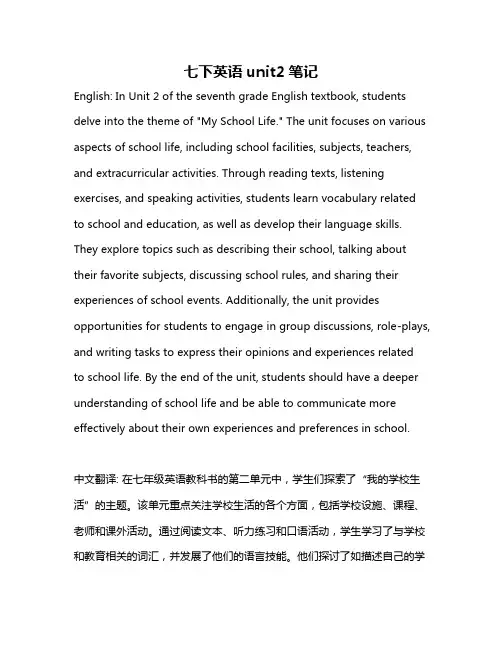
七下英语unit2笔记English: In Unit 2 of the seventh grade English textbook, students delve into the theme of "My School Life." The unit focuses on various aspects of school life, including school facilities, subjects, teachers, and extracurricular activities. Through reading texts, listening exercises, and speaking activities, students learn vocabulary related to school and education, as well as develop their language skills. They explore topics such as describing their school, talking about their favorite subjects, discussing school rules, and sharing their experiences of school events. Additionally, the unit provides opportunities for students to engage in group discussions, role-plays, and writing tasks to express their opinions and experiences relatedto school life. By the end of the unit, students should have a deeper understanding of school life and be able to communicate more effectively about their own experiences and preferences in school.中文翻译: 在七年级英语教科书的第二单元中,学生们探索了“我的学校生活”的主题。
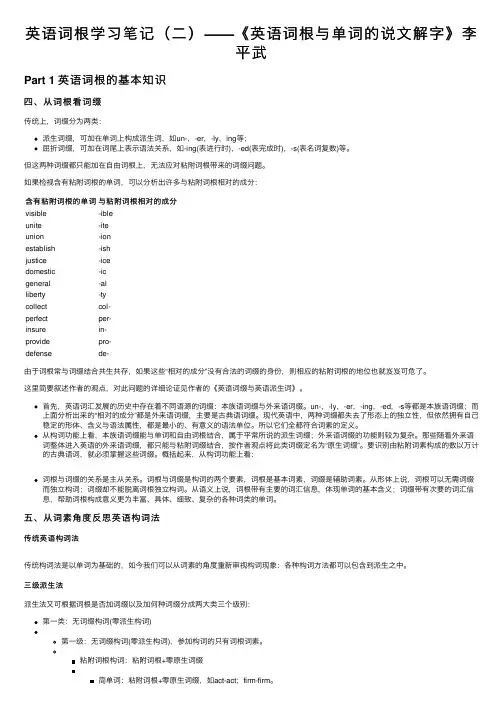
英语词根学习笔记(⼆)——《英语词根与单词的说⽂解字》李平武Part 1 英语词根的基本知识四、从词根看词缀传统上,词缀分为两类:派⽣词缀,可加在单词上构成派⽣词,如un-,-er,-ly,ing等;屈折词缀,可加在词尾上表⽰语法关系,如-ing(表进⾏时),-ed(表完成时),-s(表名词复数)等。
但这两种词缀都只能加在⾃由词根上,⽆法应对粘附词根带来的词缀问题。
如果检视含有粘附词根的单词,可以分析出许多与粘附词根相对的成分:含有粘附词根的单词与粘附词根相对的成分visible-ibleunite-iteunion-ionestablish-ishjustice-icedomestic-icgeneral-alliberty-tycollect col-perfect per-insure in-provide pro-defense de-由于词根常与词缀结合共⽣共存,如果这些“相对的成分”没有合法的词缀的⾝份,则相应的粘附词根的地位也就岌岌可危了。
这⾥简要叙述作者的观点,对此问题的详细论证见作者的《英语词缀与英语派⽣词》。
⾸先,英语词汇发展的历史中存在着不同语源的词缀:本族语词缀与外来语词缀。
un-,-ly,-er,-ing,-ed,-s等都是本族语词缀;⽽上⾯分析出来的“相对的成分”都是外来语词缀,主要是古典语词缀。
现代英语中,两种词缀都失去了形态上的独⽴性,但依然拥有⾃⼰稳定的形体、含义与语法属性,都是最⼩的、有意义的语法单位。
所以它们全都符合词素的定义。
从构词功能上看,本族语词缀能与单词和⾃由词根结合,属于平常所说的派⽣词缀;外来语词缀的功能则较为复杂。
那些随着外来语词整体进⼊英语的外来语词缀,都只能与粘附词缀结合,按作者观点将此类词缀定名为“原⽣词缀”。
要识别由粘附词素构成的数以万计的古典语词,就必须掌握这些词缀。
概括起来,从构词功能上看:词根与词缀的关系是主从关系。
词根与词缀是构词的两个要素,词根是基本词素,词缀是辅助词素。
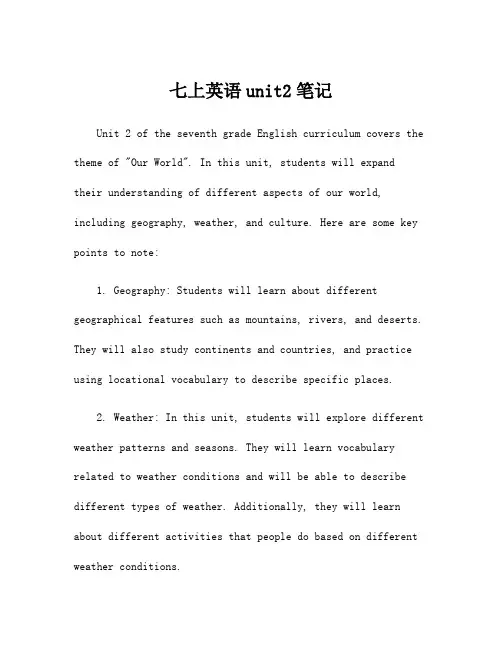
七上英语unit2笔记Unit 2 of the seventh grade English curriculum covers the theme of "Our World". In this unit, students will expandtheir understanding of different aspects of our world, including geography, weather, and culture. Here are some key points to note:1. Geography: Students will learn about different geographical features such as mountains, rivers, and deserts. They will also study continents and countries, and practice using locational vocabulary to describe specific places.2. Weather: In this unit, students will explore different weather patterns and seasons. They will learn vocabulary related to weather conditions and will be able to describe different types of weather. Additionally, they will learn about different activities that people do based on different weather conditions.3. Culture: Students will gain an understanding of different cultures around the world. They will learn about traditional clothing, food, and customs of different countries. They will also explore cultural diversity and how it contributes to a richer global community.4. Comparisons: Throughout the unit, students will be encouraged to make comparisons between their own culture and others. They will learn how to express similarities and differences between different cultures, and will be able to discuss their own traditions and customs.5. Reading and Writing: Students will read texts about different countries and cultures, and will practice summarizing and retelling the main points. They will also learn how to write short paragraphs describing different geographical features or weather conditions.It's important to note that the specific content and activities covered in Unit 2 may vary depending on thecurriculum and textbook used in your school. Make sure to follow the guidance of your teacher and consult the appropriate resources for more detailed information.。

这集的笔记要来谈谈一些抱怨的说法, 例如交通太差, 或是某个人很糟糕, 这些抱怨的用法在英文中要怎么讲? 我想人生不如意事十之八九, 所以要用到这些句子的机会也一定不少吧! 当然啦, 还是希望每个人每天都能快快乐乐地生活, 都没有什么抱怨才好.1. Our team sucks.我们这一队很烂.Suck 这个字在美国用的很多, 它就是指很烂, 很差的意思. Suck 是一个动词, 所以在使用上跟烂这个形容词是不太一样的, 例如你可以说, That traffic here really sucks! 就是说这里的交通糟透了的意思. 有时也听得到人家用 suck 的形容词 sucky. 例如有一次我室友的女朋友先是车子抛锚, 然后又下起大雨, 更糟的是她还找不到电话可以求救. 所以她那天一来我们这, 就说了一句, Today is very sucky, everything sucks. 说得很好吧!Suck 这个字的原意是指用嘴巴吸的意思, 所以有人就设计了这么一个吸果冻的比赛. 规则很简单, 就是不能用手, 只能用嘴巴把果冻吸光. 所以比赛一开始, 只听到观众大喊, Hey, you suck! 表面上听来是说, 你快点吸的意思, 事实上则是暗地里骂人烂的意思.2. I am sick and tired of doing homework.我对做作业感到厌烦.Sick and tired of something 可以视之为一个片语, 所以并没有 sick (生病) 的意思在里面! 例如贩卖机老是吃钱, 你也可以说 I am sick and tired of this vending machine. 还有一句话也很有趣, I am so sick and tired of being sick and tired. 就是说你对于老是感到厌烦已经感到十分厌烦了, 我想这是很多都市人共同的心声吧.3. I am terrible.I am horrible我很糟糕.这句并不是说我很可怕或恐怖的意思. terrible 翻成中文的意思是糟糕. 像是有次我问班上同学上次为什么没来上课? 他的回答是, I am so terrible. I keep skipping my classes. 他的意思是说他很糟糕, 常常在跷课. 有时他们也会用 terrible 来形容一个教授, He is so terrible, 就是说这个老师教的很烂, 而不是说他很会当人. 要是用 terrible 来形容一样东西, 则表示该样东西很糟糕, 例如形容食物, 如 The food is terrible, 说的当然就是食物很难吃了!Horrible 跟 terrible 的意思可说是一模一样, 两者可以互换使用, 例如, The coffee is horrible. 或是 Our professor is horrible.4. That movie was a turn-off.那部电影真是让我倒尽胃口.Turn-off 就是让你倒胃口的东西, 而 turn-on 则是你非常喜欢的东西. 例如你说 She is a turn-off. 就表示说你对她是一点兴趣都没有. 要是 She is a turn-on, 那就表示你对她蛮有兴趣的. 此外, turn-on 跟 turn-off 也可以当成一种个人喜好上的标准, 比如说徵友吧, 你说, 我不想要低于 160 cm 的, 则低于 160 就是你的 turn-off, 也等于What's not. 如果说我喜欢住在美国的, 那 "住在美国" 就是你的 turn-on. 另也有人说把 turn-on 说成 What's hot. 把 turn off 说成 What's not. 大家可以看情况自行运用.Turn on 当成动词的时候也非常普遍, 例如你可以说, The movie totally turns me off. 或是 she turns me off.5. You scared me!You frightened me!你吓到我了.被惊吓到时就是这么说的, 或是也可以说, I am scared. 记得我刚到美国第二天就在Washington D.C 迷路了. 想问路又怕自己英文不好, 所以犹豫了好久, 好不容易偷偷走到一个中年妇人的背后, 鼓起我全部的勇气, 大声地说了一句: Excuse me.. 结果你猜如何? 她居然哇的一声, 说 You scared me! 害我觉得十分地不好意思.此外, 自己被吓到你也可以说, I am scared 或是 I am frightened. Scare 跟 frightene 的意思完全相同, 可以随便选一个来用.6. That's so stupid.真是愚蠢.Stupid 这个字很好用, 它含有轻视, 不以为然的味道在里面, 比如说考试题目出的很烂, 你就可以说, that's a stupid test. 或是有人在冬天的时候提议去游泳, 你的反应大概就会是, That's a stupid idea. 个人觉得 stupid 不单只是笨的意思, 还有愚蠢的味道在里面. 中文里说: "笨笨的"还有点可爱的味道, 但英文中的 stupid 则比较像是我们说的愚蠢的意思, 听来一点也不可爱.7. I'm so pissed-off with his attitude.我对他的态度感到非常反感.Piss 原意是上小号的意思, 但是现在几乎没有人会用 piss 来代表上小号的意思了, 反而是常用在 pissed-off 这个片语上, 指的是反感, 厌恶的意思. 例如老美会说 He pissed me off. 就是说他把我给惹毛了.补充一点就是上小号可以有很多讲法, 例如 pee, take a piss, take a slash, relieve myself, take a number one, urinate 等等.8. You are mean.你很坏.Mean 这个字当形容词可以有二种解释, 一种是指别人很坏, 这种坏并不是说是坏人的坏, 而是像有时候男生喜欢耍贫嘴, 亏女孩子, 这种行为你就可以说他, You are so mean.另外一种 mean 则是解释成 "贱". 我想就是指它的行为很让人瞧不起, 比如说吧! 有一只猫, 你拿东西给它吃, 它就过来跟你亲热, 你没东西给它吃它就躲的远远的, 这样的行为你就可以用 mean 来形容. 你可以说 The cat is so mean.有时候 mean 在口语中也可以当成 cool 的意思喔! 例如别人看到一辆很拉风的跑车, 他说, "Wow, look at that car, that is mean!" 在这里不可能说一部车很贱, 所以这个 mean 就是当成 cool 来解释.9. He is shaky.他不太可靠.Shaky 是指动摇不稳定, 不太确定, 通常就是指一个人不太可靠. 另外 Shaky 也可以用来形容数据, 像是有一次教授就在课常上说, The data is shaky, 就是说这些 data 怪怪的, 不太可靠. Shaky 另外有一个惯用法, He has a shaky start. 就是说有人要上台报告准备却不够充份, 以致一上去就开始紧张, 冒冷汗, 不知所云, 这种情况老美就会说, He has a shaky start. 或是另一个很意思很接近的说法, "He has a bumpy ride."10. Don't act black.不要跟黑人一样.虽然现在都已经快要迈入二十一世纪了, 不过时至今日还是有些白人会歧视黑人的, 尤其是老一辈的白人, 有时候他们的孩子作错了什么事, 他们还会骂说 Don't act black. 但是这是句非常有种族歧视的话, 不要乱用, 当然也希望各位国人来到国外时要为华人争一点面子, 不要让老美说 Don't act Chinese. 那样就很不好了.附记: 曾有人写了一封信跟我谈到, 关于 'suck' 这个字该不该用. 大家参考看看.I noticed something that I wanna tell you.. Maybe it's not a big deal actually. In your message, I saw a word "sucks" um.. I think that's not a good word though... you know I think girls souldn't say that words.. even a guy... I don't know I can hear that word all over the place but I still can't get used to it.. in my opinion, that's worser than say "fuck" or "shit" but that are all bad words anyway.. ok, don't say those words ok? cause I have very expectation on you and I don't want to hear those words from you ok? maybe it's not that big deal though.... don't know..笔者是觉得在美国说 suck 或许没有 shit 或 fuck 来的这么槽, 但是没把握还是不要乱用这个字比较好. 如果要用, 请用在同辈之间及比较熟的好朋友身上.“成千上万人疯狂下载。
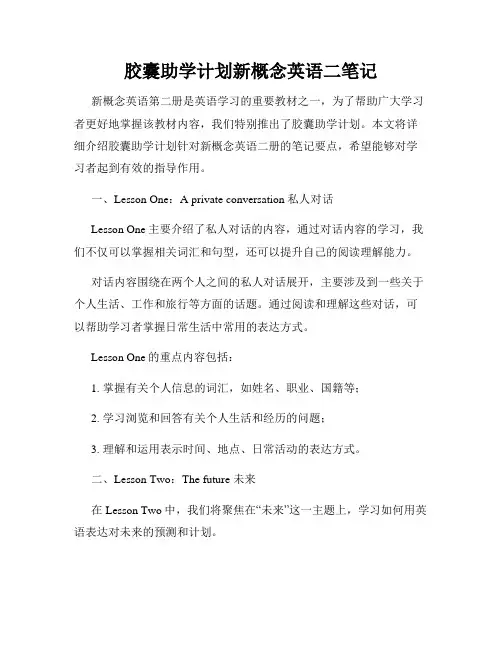
胶囊助学计划新概念英语二笔记新概念英语第二册是英语学习的重要教材之一,为了帮助广大学习者更好地掌握该教材内容,我们特别推出了胶囊助学计划。
本文将详细介绍胶囊助学计划针对新概念英语二册的笔记要点,希望能够对学习者起到有效的指导作用。
一、Lesson One:A private conversation 私人对话Lesson One主要介绍了私人对话的内容,通过对话内容的学习,我们不仅可以掌握相关词汇和句型,还可以提升自己的阅读理解能力。
对话内容围绕在两个人之间的私人对话展开,主要涉及到一些关于个人生活、工作和旅行等方面的话题。
通过阅读和理解这些对话,可以帮助学习者掌握日常生活中常用的表达方式。
Lesson One的重点内容包括:1. 掌握有关个人信息的词汇,如姓名、职业、国籍等;2. 学习浏览和回答有关个人生活和经历的问题;3. 理解和运用表示时间、地点、日常活动的表达方式。
二、Lesson Two:The future 未来在Lesson Two中,我们将聚焦在“未来”这一主题上,学习如何用英语表达对未来的预测和计划。
通过对话的形式,我们可以学习到有关未来时间状语的使用以及一些表示未来的动词形式。
同时,这一课还涉及到一些关于学业和职业规划的话题,可以帮助学习者提前思考并准备好未来的发展方向。
Lesson Two的重点内容包括:1. 掌握表示未来的时间状语,如tomorrow, next week等;2. 学习使用一般将来时,表达将来的动作或状态;3. 理解和运用有关职业规划和未来计划的表达方式。
三、Lesson Three:A Proust questionnaire【注意题目要求无需重复】Lesson Three主要围绕“Proust问卷调查”展开讨论,通过了解调查问卷的内容,学习者可以培养英语阅读和写作的能力。
在这一课中,我们将了解到Proust问卷调查的问题形式以及回答方式。
同时,还可以通过完成类似的问卷,锻炼自己的写作和表达能力。
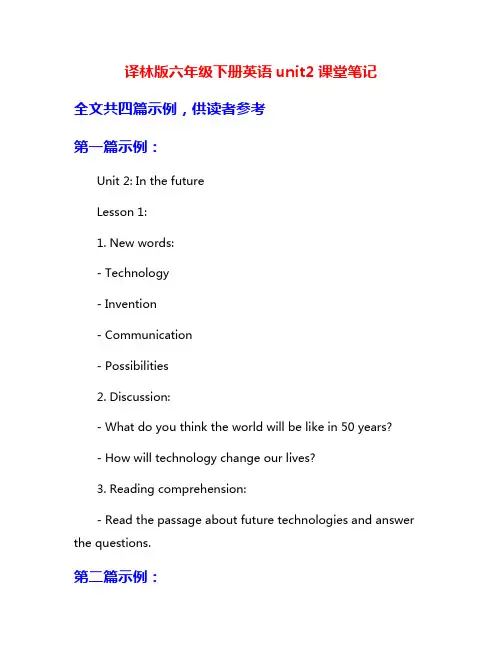
译林版六年级下册英语unit2课堂笔记全文共四篇示例,供读者参考第一篇示例:Unit 2: In the futureLesson 1:1. New words:- Technology- Invention- Communication- Possibilities2. Discussion:- What do you think the world will be like in 50 years?- How will technology change our lives?3. Reading comprehension:- Read the passage about future technologies and answer the questions.第二篇示例:Unit 2 讲的是关于"Let's play sports"这个主题。
在这个单元里我们学习了各种各样的运动项目以及如何表达我们对运动的兴趣和爱好。
在这个单元的第一部分,我们学习了一些运动项目的名词和动词,比如"football","basketball","swim","run"等等。
我们也学习了一些与运动相关的形容词和副词,比如"fast","slow","hard","well"等等。
通过学习这些词汇,我们可以更准确地描述不同的运动项目以及我们在运动中的表现。
在单元的最后部分,我们学习了一些有关体育明星和运动项目的介绍,比如"Cristiano Ronaldo is a famous football player","Table tennis is a popular sport in China"等等。
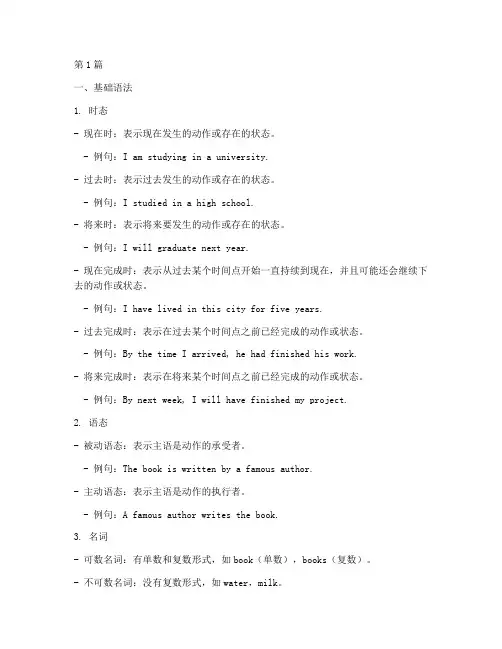
第1篇一、基础语法1. 时态- 现在时:表示现在发生的动作或存在的状态。
- 例句:I am studying in a university.- 过去时:表示过去发生的动作或存在的状态。
- 例句:I studied in a high school.- 将来时:表示将来要发生的动作或存在的状态。
- 例句:I will graduate next year.- 现在完成时:表示从过去某个时间点开始一直持续到现在,并且可能还会继续下去的动作或状态。
- 例句:I have lived in this city for five years.- 过去完成时:表示在过去某个时间点之前已经完成的动作或状态。
- 例句:By the time I arrived, he had finished his work.- 将来完成时:表示在将来某个时间点之前已经完成的动作或状态。
- 例句:By next week, I will have finished my project.2. 语态- 被动语态:表示主语是动作的承受者。
- 例句:The book is written by a famous author.- 主动语态:表示主语是动作的执行者。
- 例句:A famous author writes the book.3. 名词- 可数名词:有单数和复数形式,如book(单数),books(复数)。
- 不可数名词:没有复数形式,如water,milk。
- 名词所有格:表示所属关系,如the teacher's book,my friend's car。
4. 代词- 人称代词:I(我),you(你),he(他),she(她),it(它),we(我们),they(他们)。
- 物主代词:my(我的),your(你的),his(他的),her(她的),its(它的),our(我们的),their(他们的)。
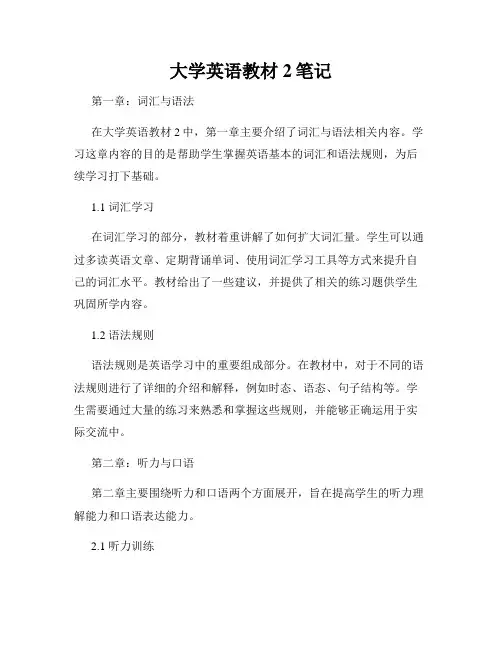
大学英语教材2笔记第一章:词汇与语法在大学英语教材2中,第一章主要介绍了词汇与语法相关内容。
学习这章内容的目的是帮助学生掌握英语基本的词汇和语法规则,为后续学习打下基础。
1.1 词汇学习在词汇学习的部分,教材着重讲解了如何扩大词汇量。
学生可以通过多读英语文章、定期背诵单词、使用词汇学习工具等方式来提升自己的词汇水平。
教材给出了一些建议,并提供了相关的练习题供学生巩固所学内容。
1.2 语法规则语法规则是英语学习中的重要组成部分。
在教材中,对于不同的语法规则进行了详细的介绍和解释,例如时态、语态、句子结构等。
学生需要通过大量的练习来熟悉和掌握这些规则,并能够正确运用于实际交流中。
第二章:听力与口语第二章主要围绕听力和口语两个方面展开,旨在提高学生的听力理解能力和口语表达能力。
2.1 听力训练听力训练是提高听力能力的有效途径之一。
教材中提供了大量的听力材料,包括对话、新闻、讲座等,以帮助学生听懂并理解不同语速和语调的英语音频。
通过多次听取、模仿和分析,学生可以逐渐提高自己的听力技巧。
2.2 口语训练口语是实际交流中最为常用的表达方式之一。
在口语训练中,教材提供了一系列的口语练习,包括日常对话、演讲、辩论等。
学生需要通过模仿、练习和与他人的互动来提高自己的口语表达能力。
同时,教材还提供了一些常用口语表达和技巧,供学生参考和运用。
第三章:阅读与写作第三章的内容主要是阅读和写作的训练,旨在培养学生的阅读理解和写作能力。
3.1 阅读训练阅读是扩大词汇量、提高语言理解能力的有效方法之一。
在阅读训练中,教材提供了一系列的阅读材料,包括文章、新闻、故事等。
学生需要通过阅读并回答相关问题来检验自己的理解能力,并从中学习和积累语言知识。
3.2 写作训练写作是语言表达的重要形式之一。
在写作训练中,教材引导学生从构思、组织到表达,逐步提高他们的写作能力。
教材提供了写作范文以及相关的写作指导,使学生能够更好地掌握写作技巧和表达方式。
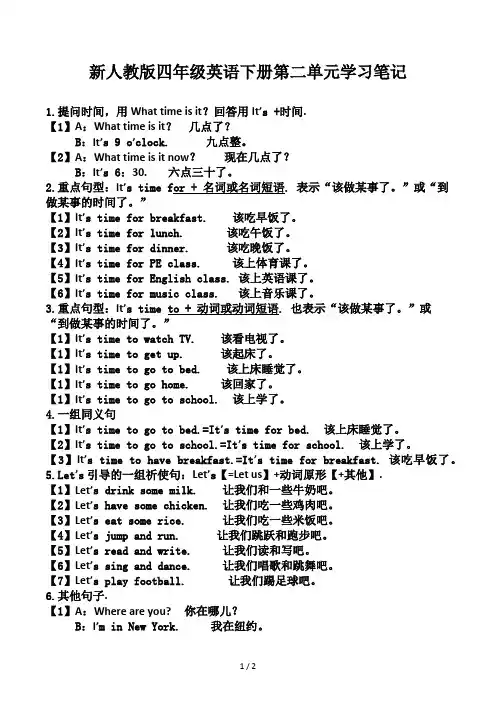
新人教版四年级英语下册第二单元学习笔记1.提问时间,用What time is it?回答用It’s +时间.【1】A:What time is it?几点了?B:It’s 9 o’clock. 九点整。
【2】A:What time is it now?现在几点了?B:It’s 6:30. 六点三十了。
2.重点句型:It’s time for + 名词或名词短语. 表示“该做某事了。
”或“到做某事的时间了。
”【1】It’s time for breakfast. 该吃早饭了。
【2】It’s time for lunch. 该吃午饭了。
【3】It’s time for dinner. 该吃晚饭了。
【4】It’s time for PE class. 该上体育课了。
【5】It’s time for English class. 该上英语课了。
【6】It’s time for music class. 该上音乐课了。
3.重点句型:It’s time to + 动词或动词短语. 也表示“该做某事了。
”或“到做某事的时间了。
”【1】It’s time to watch TV. 该看电视了。
【1】It’s time to get up. 该起床了。
【1】It’s time to go to bed. 该上床睡觉了。
【1】It’s time to go home. 该回家了。
【1】It’s time to go to school. 该上学了。
4.一组同义句【1】It’s time to go to bed.=It’s time for bed. 该上床睡觉了。
【2】It’s time to go to school.=It’s time for school. 该上学了。
【3】It’s time to have breakfast.=It’s time for breakfast. 该吃早饭了。
5.Let’s引导的一组祈使句:Let’s【=Let us】+动词原形【+其他】.【1】Let’s drink some milk. 让我们和一些牛奶吧。
初一英语2单元笔记整理上了初一之后,英语这门课可真是让我又爱又“恨”。
爱它是因为学会了就能和外国人交流,感觉超酷;“恨”它呢,是因为知识点太多啦,不认真整理可就容易晕头转向。
这不,最近在学第二单元,我好好地整理了一番笔记,那过程真是“精彩纷呈”。
先来说说单词吧。
这单元的单词那叫一个多,像“parent”(父母)、“grandparent”(祖父母)、“sister”(姐妹)、“brother”(兄弟)等等。
记这些单词的时候,我可是费了好大的劲儿。
我把单词写在小卡片上,贴在房间的各个角落,刷牙的时候看看“sister”,睡觉前瞅瞅“brother”,就连上厕所都能瞄到“parent”。
我妈还笑话我,说我这是要让家里到处都充满英语的“味道”。
然后是语法,这可是重点中的重点。
什么“名词的复数形式”,一开始我真的是一头雾水。
比如说“apple”变成“apples”,“box”变成“boxes”,这里面的规则可多了。
我就在本子上一遍又一遍地写,一边写一边念叨:“一般情况加 s,以 s、x、sh、ch 结尾加es……”写得我手都酸了,不过还真有点效果,至少做题的时候能反应过来一些了。
说到句子,“This is my sister. These are my parents.”(这是我的姐妹。
这些是我的父母。
)这种简单的句子还好,一遇到复杂点的,像“There are some books on the desk.”(桌子上有一些书。
)我就得琢磨半天,分析句子结构。
为了记住这些句子,我还自己编了一些小场景,想象自己在教室里指着桌子说这些话,感觉还挺有趣的。
还有那些短语,“a photo of my family”(我的一张家庭照片)、“in the first photo”(在第一张照片里),我把它们都记在一个专门的小本子上,没事就拿出来翻翻。
在整理笔记的过程中,我还闹了不少笑话。
有一次,我正一边写一边背单词,我爸进来问我在干嘛,我头也不抬地说:“我在和这些单词‘打架’呢,它们太难对付啦!”我爸听了哈哈大笑。
七下英语二单元笔记
第二单元的内容主要围绕着“School Life”展开,涵盖了学校
生活中的各个方面。
在这个单元中,我们学习了关于日常学校生活
的词汇、短语和句子,以及相关的语法知识。
首先,我们学习了关于学校设施和地点的词汇,比如
classroom(教室)、library(图书馆)、playground(操场)等。
我们也学习了表示时间的词汇,比如morning(早上)、afternoon (下午)等。
此外,我们还学习了一些日常用语和表达方式,比如“How are you?”(你好吗?),“What’s your favorite subject?”(你最喜欢的科目是什么?)等。
除了词汇和短语,我们还学习了一些相关的语法知识。
比如,
介绍了现在进行时态,用来描述当前正在发生的动作或状态,例如
“I am reading a book.”(我正在读书)。
我们也学习了一些表
示喜好和习惯的句型,比如“I like playing football.”(我喜
欢踢足球)。
在阅读和听力方面,我们通过课文和录音材料了解了一些关于
学校生活的具体情景,比如学生在图书馆借书、老师在教室上课等。
通过这些材料,我们不仅扩展了词汇量,还加深了对学校生活的了解。
总的来说,第二单元的学习内容丰富多彩,涵盖了学校生活的方方面面,帮助我们更好地了解和表达关于学校生活的内容。
通过这些学习,我们不仅提高了英语水平,也对学校生活有了更深入的了解。
新概念第三册课文翻译及学习笔记:Lesson2【课文】 Was the vicar pleased that the clock was striking? Why? Our vicar is always raising money for one cause or another, but he has never managed to get enough money to have the church clock repaired. The big clock which used to strike the hours day and night was damaged many years ago and has been silent ever since. One night, however, our vicar woke up with a start: the clock was striking the hours! Looking at his watch, he saw that it was one o'clock, but the bell struck thirteen times before it stopped. Armed with a torch, the vicar went up into the clock tower to see what was going on. In the torchlight, he caught sight of a figure whom he immediately recognized as Bill Wilkins, our local grocer. 'Whatever are you doing up here Bill?' asked the vicar in surprise. 'I'm trying to repair the bell,' answered Bill. 'I've been coming up here night after night for weeks now. You see, I was hoping to give you a surprise.' 'You certainly did give me a surprise!' said the vicar. 'You've probably woken up everyone in the village as well. Still, I'm glad the bell is working again.' That's the trouble, vicar,' answered Bill. 'It's working all right, but I'm afraid that at one o'clock it will strike thirteen times and there's nothing I can do about it." We'll get used to that, Bill,' said the vicar. "Thirteen is not as good as one, but it's better than nothing. Now let's go downstairs and have a cup of tea." 【课文翻译】 我们教区的牧师总是为各种各样的事筹集资金。
1、前缀+词根(前缀改变单词的逻辑方向)fore-前、向前、提前(8词)fore-head→前面的头→前额n.fore-arm→前面的臂→前臂/小臂n.fore-leg→前腿→小腿n.fore-finger→前指(除大拇指外其余四指排名在前指头)→食指(middle-finger中指、ring-finger →带戒子的手指→无名指、little-finger→小指、thumb-finger→大拇指)n.fore-father→以前的父亲→前辈→祖先n.fore-bear(born)→以前出生→前辈→祖先n.fore-cast(播撒)→提前播撒→预报n.(broad-cast→广播,cast→丢、扔)、weather forecast 天气预报fore-see→提前看见→预见vt.fore-tell→提前说出→预言vt.所有词汇中是动词最重要,首先要关注动词ex-外、出来im-/in-里、否定(非、不、相反)pro-/pre-前(未来的时间)com-/con-/cor-/col-/co-一起/共同re-再次;回/往回/反dis-否de-向下pose→n.姿势v.放/置/摆;引起,产生,提出ex-pose→往外放→使暴露vt.im-pose→把东西往里面放→强加于vt.pro-pose→未来的事情提前摆出来→建议vt.com-pose→放置到一起→组成vt.re-pose→把自己往回放→休息vt.dis-pose→否定的放置某物→处理掉vi. eg: dispose of rubbish 把垃圾处理掉de-pose→向下摆放→贬值/废除2、词根+后缀(后缀改变词的词性)-er/-or/-ar n. 人/物school-ar→学校的人→学者n.第二节49分钟cook-er→厨具、厨师n.type-writ-er→打字机typ-ist→打字员sky-scrap-er→摩天大厦fold-er→折叠椅3、前缀+词根+后缀con-centr-ate→一起跑到中心来→集中vt.(-ate表动词)pre-sid-ent→前边的人→主席、校长、总裁、总统(-ent名词词性通常表人)preside 主持、主导v.preside over sth.re-sid-ent→回到这边的人→居民reside vi. 居住reside in 居住在……4、elsere-in-force→再次注入力量→增援、加固vt. to reinforce the army 增援军队二、近形词、形近词Lamp n.灯Limp v.瘸子Limb n.肢体Lame adj.瘸的Lamb→来吧→小羊羔Lime n.来摸一下很汤→石灰Lamb小羊羔Lame缺了Lamp我把它放在灯光底下,看了看它的Limb肢体,然后给它打上些Lime石灰它就是Limb瘸着腿走路了-tainattain v.到达obtain vt.获得pertain vi.属于entertain vt. 娱乐retain vt.保持contain vt.容纳maintain vt.保养sustain vt.维持detain vt.耽搁,延误abstain vi.戒除stainless adj.无污点的二节完三、近义词(写作、口语→output)peep vi.偷窥+atstare vi.盯着看,瞪眼+atglare vi.怒视+atgape vi.傻傻的看+atpeer vi.凝视+atlook at vi强调看的动作see vt. 强调看的结果read a book 看书(看具体的内容)glance vi.一瞥cast a glance at快速的看向……(cast 投、扔at指方向、动作)glimpse vi.瞥见,瞥到catch the glimpse of(of强调结果)四、一词多义联想记忆法spring n.春天,泉水,弹簧;v.弹跳(春天来了,泉水像弹簧一样弹跳起来了)board n.木板,a white board 白板,a bare board 光板牌,a notice board 布告牌,a sign board 标识牌盘,a chess board 棋盘桌(板)子,above the board 在赌桌上,光明正大;sweep up the board 扫光赌桌→打胜;lodging and board餐桌; the board of election 选举桌→选举委员会;theboard of electricity 电力局甲板→交通工具,get on board the plane/bus/train 登上飞机/公交车/火车五、拆文解字法handicap→hand+i+cap 手爱戴帽子→残疾n.;使残疾vt. ;handicap adj. 残疾的alienation n. a+lie+nation 一个撒谎的民族→疏远;innocent adj. in+no+cent 包里没有一分钱→清白的cargo n. car+go 车走了→货物(运输途中的货物)与goods区别六、谐音sting vt. s+ting→使劲叮→叮mugn. mu+g麻哥→臭虫、强盗vt.打劫torpedo n. tor+pe+do 鱼雷pest n.拍死它→害虫pat v.拍它→轻拍gangster n.干死他→匪徒spouse n.死抱死→死也要抱着死→配偶taboo n. 特不→特别不能做的→禁忌mumble vi. 妈抱→小孩叫妈妈抱→不清楚的说turbulent adj. 特别乱的→狂乱的,紊乱的pyjamas n.披件麻丝→睡衣第三节47分钟七、不择手段记忆法grace n. g+race 赛跑中的哥哥→优雅groom n. g+room 房间里的哥哥→新郎官gloom n. g+loom 织布机旁的哥哥→忧郁grope n. g+rope 哥哥拿一把绳子→摸索frugal adj. 腐乳够→吃点腐乳就够了→节俭的八、语竟组词字→词→句→文pitA fall in the pit(坑), a gain in your wit(智力).坑里跌一下,智力就增长一下→吃一堑,长一智。
八下英语第二单元笔记以下是八下英语第二单元的笔记,希望对您有所帮助。
一、重点单词1. vacation n. 假期2. exciting adj. 令人兴奋的3. disagree v. 不同意4. agree v. 同意5. rent v. 租用6. beach n. 海滩7. because conj. 因为8. headache n. 头痛9. cough n. 咳嗽10. fever n. 发烧二、重点短语1. stay at home 待在家里2. go to the mountains 去山上3. go to the beach 去海滩4. visit museums 参观博物馆5. go to the movies 看电影6. stay in bed 卧床休息7. have a good time 过得开心8. feel like doing sth 想做某事9. go for a walk 去散步10. practice doing sth 练习做某事三、重点句子1. I want to go somewhere interesting. 我想去有趣的地方。
2. We’re planning to go to New York for vacation. 我们计划去纽约度假。
3. She would rather stay at home than go out in the rain. 她宁愿待在家里也不愿出去淋雨。
4. He is considering renting a car. 他正在考虑租一辆车。
5. I hope to have a restful vacation this year. 我希望今年能度过一个轻松的假期。
Unit2HobbiesP181.bring joys to our life把快乐带给我们的生活【bring带来①bring sth tosb把某物带给某人(to方向性)②bring sth for sb为某人带来某物(for 服务性)】2.some students’hobbies一些学生的爱好3.after-school clubs课外的俱乐部【区分after-school形容词课外的after school放学后】4.think about思考、考虑【区分①think about思考的对象为事物,更深层次和持续时间更长的思考过程②think of思考的对象既可以为人也可以为物,通常表示一种短暂、即时的、突发性的或瞬间的的思考】5.be important for us对我们来说很重要【①It is important for sb to do sth对某人来说做某事很重要②important形容词重要的importance 名词重要性the importance of···的重要性】☆①It’s+adj+to do sth做某事是···的。
It's exciting to travel to new places.去新地方旅行是令人兴奋的。
②It's+adj+of sb+to do sth:of前的形容词用来形容人物的性格。
某人做某事是···的。
It is so nice of him to help the old people.他很善意去帮助那些老人。
③It's+adj+for sb+to do sth.:for前的形容词用来描述do后面的事物的。
某人做某事是···的。
It is difficult for him to do his homework.对他来说做他自己的作业是很难的。
Unit 3 Early to bed, early to rise...1.New words on bookchronically : permanently, constantly chronic : always presentdroop : hang or bend down dim : low, not brightwaves of sleepiness : strong feelings of fatigue, tiredness blinking : closing and openingsurge : a boost, increase out of sync : on a completely differentalert : able to think clearly captivating : very interestingirritable : easily and quickly annoyed hormones : chemical substancesmiserable : very unhappy fatigue : extreme tirednesssuspect : believe to be true accumulate : adds upsnore : breathe noisily while sleeping spontaneous: happening without planningcranky : easily irritated or annoyed subtle: indirectpriority: most important thing to do blink : open and close your eyes quicklydo without : not have alertness : focus and concentrationburn the midnight oil : work very late at night drowsy : half asleepnaps : short periods of sleep shut-eye : sleep (informal)irritable : getting annoyed quickly or easily run by : have someone considercatch 40 winks : to go sleep for a very brief amount of timepower nap : a short sleep in the middle of the working day thathelps you to have more energy, do your jobbetter,and make better decisions2. V ocabulary buildingconstellations / harvest / ivory tusk / sort / escalate / appropriate / be determined by / be intended to do /instinctive reaction / be dedicated in / frustrated / be suffering from / serious problem / aggressive / amusedenthusiastic / respectful / victim / have insomnia / suffer from insomnia /exhausted / yawn / rub your eyes /effect (n) / affect (v) / to whine / toss and turn / kick off the covers / grind teeth / automatically / persona /enthusiastic about / make sth a priority / wide awake / insomniac/ insure / ensure / assure / reward / awardmeasurements / adorable / weird / humiliating / arrange for3. Synonymrising - escalating (population, tuition, temperature, housing price...)initially - primarily sum up - summarize - outline (v)sort - systematize rash - hasty - imprudentsleepy - drowsy - slumbrous unless - only ifamuse - entertain completely awake - wide awake4. PS:(word choice) Although caleb performs well in all of his classes, he finds classes with a smaller amount of students to be the most beneficial.A.CORRECT AS ISB. Less amountC. Less numberD. Smaller numberThe best answer is D. "amount" is used to denote a quantity of something that cannot be divided into separate units.Because the sentence refers to students, who can be individually counted, "number" is the best word to use.Likewise, "less" refers to a quantity of degree of something, not to a number of something, making "smaller" the best choice.(compare) insure ensure assure reward award5. Present unreal conditionals ( if + past form of the verb, would / could / might + base form of the verb )If I didn't work at night, I could go to bed early.If Kate didn't have such a hectic lifestyle, she would spend more time asleep.If more people paid attention to their sleep habits the problem would not be so serious.If people knew more about the dangers of sleep deprivation, the might treat their sleep habits more seriously.If you were sleep-deprived, would you be able to tell? ( be="were" for all subjects )How would you be able to tell?If I were a doctor, I would tell my patients about sleep debt.Have sth done : we arrange for sb else to do sth for us.(in informal spoken English we also say "get sth done".Where did you have your hair cut?How often do you have your car serviced?Kiki had the roof repaired yesterday.Sometimes have/get sth done has a different meaning. We use it to say that sth happens to sb or their belongings.Usually what happens is not nice.I got my wallet stolen / lost .Have you ever had your flight / classes canceled?Have you ever had your car crashed?6. SpeakingI have never heard... I'm in a bit quandary. My passport expired. I'm just showing off.You don't have a story, so make one up. It's not that easy. It's a sickness.I can't believe we're tied. You do that, and we're evenIt's not just for satisfying my curiosity. That is a big incentive. That can't be.You're such a sweetie. What more do I need? An announcement on Facebook?Consider it done. This is so humiliating. Proud of you. I'm embarrassed about this.You have every right to be upset. Do I look worried? It's kinda hard to tell.That was fake, too. You idiot. I happen to know a guy who...No wonder he couldn't say anything. The wounds are still fresh, I understand.I have something to deal with. Speaking of which...I just need you to keep this lie alive. Relax, you don't know for sure.What's that about? You know I don't care this kind of stuff.I just didn't have the heart to ...7. Requests to clarify information Excuse me? What was that you said?What?(informal)Sorry?I'm sorry, I didn't catch that. Could you say that again?Could you repeat that?Sorry, I didn't hear you. What was that?Could you say that another way?。